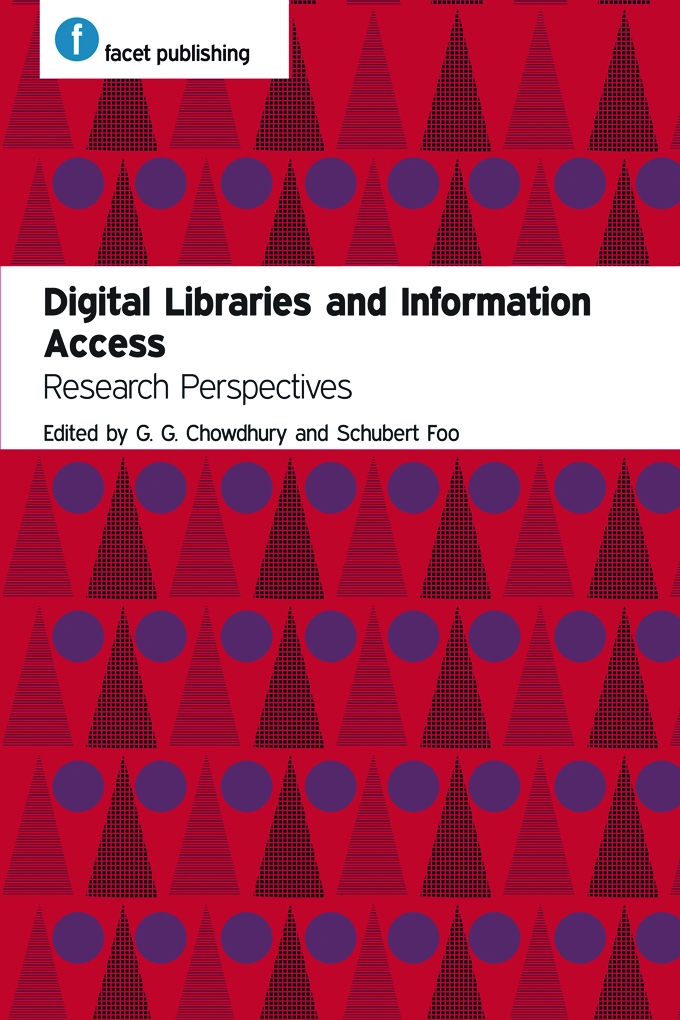Book contents
- Frontmatter
- Contents
- Foreword
- Editors and contributors
- 1 Digital libraries and information access: introduction
- 2 The design and architecture of digital libraries
- 3 Metadata and crowdsourced data for access and interaction in digital library user interfaces
- 4 Information access
- 5 Collaborative search and retrieval in digital libraries
- 6 The social element of digital libraries
- 7 Towards socially inclusive digital libraries
- 8 Users’ interactions with digital libraries
- 9 Digital libraries and scholarly information: technology, market, users and usage
- 10 Digital libraries and open access
- 11 iSTEM: integrating subject categories from multiple repositories
- 12 The usability of digital libraries
- 13 Intellectual property and digital libraries
- 14 Digital preservation: interoperability ad modum
- 15 Digital libraries and information access: research trends
- Index
- Miscellaneous Endmatter
6 - The social element of digital libraries
Published online by Cambridge University Press: 08 June 2018
- Frontmatter
- Contents
- Foreword
- Editors and contributors
- 1 Digital libraries and information access: introduction
- 2 The design and architecture of digital libraries
- 3 Metadata and crowdsourced data for access and interaction in digital library user interfaces
- 4 Information access
- 5 Collaborative search and retrieval in digital libraries
- 6 The social element of digital libraries
- 7 Towards socially inclusive digital libraries
- 8 Users’ interactions with digital libraries
- 9 Digital libraries and scholarly information: technology, market, users and usage
- 10 Digital libraries and open access
- 11 iSTEM: integrating subject categories from multiple repositories
- 12 The usability of digital libraries
- 13 Intellectual property and digital libraries
- 14 Digital preservation: interoperability ad modum
- 15 Digital libraries and information access: research trends
- Index
- Miscellaneous Endmatter
Summary
Introduction
Since the 1990s much interest has been generated in digital libraries. This has led to several digital libraries conferences and journals, such as the International Conference of Asian Digital Libraries, the Joint Conference on Digital Libraries and the International Journal on Digital Libraries. Other than researchers, library practitioners have also shown much enthusiasm in digital libraries, with various initiatives by libraries to make digital libraries widely accessible, digitization projects and the development of document management systems. Over the years, digital libraries have broadened in their conceptualization and offer different connotations for both practitioners and researchers, although these meanings may not always be mutually exclusive.
Such a broad conceptualization of digital libraries is not accidental, according to Borgman (1999). She offered the explanation that research on digital libraries had attracted a large number of scholars from various disciplines, such as information retrieval, library studies, archives and computer science. This community, consisting of practitioners and researchers, has worked at different stages of the life cycle of digital libraries, in both theoretical and applied aspects. This has further led to the emergence of several definitions of digital libraries, as shown in Table 6.1. In Borgman's (1999) paper, more sources discussing each definition can be found, but for the purposes of this chapter only those that are the most encompassing of the core elements of each definition are selected.
In addition to the definitions provided by communities of both researchers and practitioners, Borgman (1999) also pointed out that none of these definitions recognizes the many digital databases that exist on the world wide web, CD-ROMs and the hidden web such as LexisNexis. Some of these databases may be viewed as ‘incomplete’ content collections, given that they may not be organized around the information needs of specific communities, and lack standards and cataloguing. Moreover, the world wide web is not an institution and therefore would not fit in with the definition of library practitioners. However, since Borgman's paper, various institutions have initiated projects to carry out large-scale digitization and made the results available on the world wide web.
- Type
- Chapter
- Information
- Digital Libraries and Information AccessResearch perspectives, pp. 83 - 96Publisher: FacetPrint publication year: 2012



